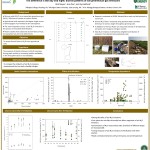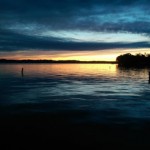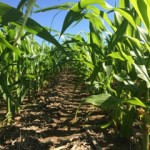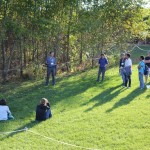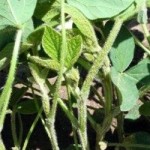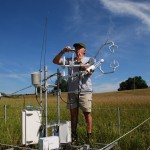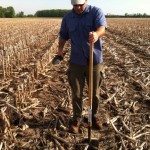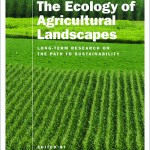Each summer the KBS LTER supports students to participate in the Research Experiences for Undergraduates (REU) program, funded by the NSF. This is part of a larger undergraduate research program at KBS. Rick Moyer is majoring in environmental studies at Albright College. He wrote about his REU experience working with KBS LTER Postdoctoral Research Associate Ilya Gelfand in Phil Robertson's lab. If you are ever offered a position at the Kellogg Biological Station, wipe all expectations from your mind and use that saved space to learn the game of euchre. When I received the email
Expectations: reflections from an undergrad researcher
Full Immersion: reflections from an undgrad researcher
The Great Lakes Bioenergy Research Center supports students to participate in a Research Experiences for Undergraduates (REU) program at KBS during the summer. This is part of a larger undergraduate research program at KBS. Matthew Carey is studying at Norfolk State University. He wrote about his REU experience working with KBS GLBRC Research Associate Karen Nikolakakis in Katherine Gross' lab. Full Immersion: My Life as a KBS REU The best way to describe my twelve week experience with the Research Experience for Undergraduate program at the Kellogg Biological Station is as a full
My recipe for becoming a scientist: reflections from an undergrad researcher
Each summer the KBS LTER supports students to participate in the Research Experiences for Undergraduates (REU) program, funded by the NSF. This is part of a larger undergraduate research program at KBS. Gabriela Sinclair is studying at The College of Charleston. She wrote about her REU experience working with KBS LTER PhD student Kate Glanville;in Phil Robertson's lab. ~~ My Recipe for Becoming a Scientist: Summer at KBS Timeline Application Submission: February 18th Duration: 12 weeks Arrival: May 17th Poster Presentation: July 31st Departure: August 8th Blog Post Submission: August
KBS LTER field tour for investigators on Sept. 25
The 2015 KBS LTER Fall Field Tour for Investigators is scheduled for Friday, September 25, at 4 p.m. at KBS. Guided tours of LTER and GLBRC field experiments will be followed by an evening barbecue. During the event, you'll have opportunity to tour field experiments, hear some research presentations, and meet with colleagues, old and new. To register (required), please rsvp to Dr. Neville Millar, LTER Science Coordinator, millarn@msu.edu.
Understanding farmer participation in conservation auctions to enhance ecosystem services
Each year the KBS LTER program awards one full-year Graduate Student Fellowship. Here Leah Harris Palm-Forster describes her research that was supported by the 2014 LTER Graduate Fellowship. Leah obtained her Ph.D. working with Professor Scott Swinton in MSU's Department of Agricultural, Food, and Resource Economics and is now an Assistant Professor at the University of Delaware in the Department of Applied Economics and Statistics. ~~ Going once, going twice, … bought from the lowest bidder! Hold on, what kind of auction is that? Why is the auctioneer buying something and why does the
The surprising connection between neonicotinoids, soybean aphid, and invasive ladybeetles
This post explores a new paper by KBS LTER scientists Drs. Christie Bahlai and Doug Landis, Shifts in dynamic regime of an invasive lady beetle are linked to the invasion and insecticidal management of its prey. The paper is now available as a preprint at Ecological Applications. A version of this post, written by Dr. Bahai, originally appeared on her blog, Practical Data Management for Bug Counters. ~~ Neonicotinoids, a commonly used class of broad-spectrum insecticides, have been the subject of much controversy in recent years, particularly their impacts on bees, birds, and their
Generosity of local farmer creates national impact
Harold and Edythe Marshall’s gift of their 300-acre farm to Michigan State University has been a major boon to understanding the ecology of new biofuel crops, producing research results with national impact by scientists at MSU's Kellogg Biological Station (KBS). Under a unique partnership between the Marshalls and MSU, the farmland east of Hickory Corners in Barry County is enabling scientists from the KBS Long-term Ecological Research (LTER) program and the Great Lakes Bioenergy Research Center (GLBRC) to conduct unique biofuel research with funding from the US Department of Energy
A new approach to soil testing for Michigan farmers: from inputs to indicators of soil health
Each year the KBS LTER program awards two graduate students with summer research fellowships. Here Brendan O'Neill describes the research his summer fellowship supported. Brendan is a Ph.D. student in Tom Schmidt and Phil Robertson's labs. ~~~ My research at the Kellogg Biological Station Long-term Ecological Research (KBS LTER) site has focused on how increasing crop diversity (for example, including cover crops) can enhance soil ecosystem functions while sustaining crop production. Examples of soil ecosystem functions include retaining carbon (C) and nitrogen (N) within the field and
KBS LTER synthesis book published
As spring approaches, thousands of farmers across the Midwest are preparing for planting, knowing well the importance of their work in supplying society with food. They may be less aware of the potential for their row crops to provide a host of additional benefits, including clean water, habitat for beneficial insects such as pollinators, and even climate change mitigation. Agriculture’s role in providing such benefits has been the subject of over 25 years of research at the Kellogg Biological Station (KBS) in southwest Michigan. With long-term support from the National Science Foundation and
Paradigm shifts: Re-envisioning agricultural landscapes to optimize ecosystem services
In 2013, the United Nations released a report projecting that the global population will reach 9.6 billion by the year 2050. This increase of 2.4 billion people between now and then is already beginning to challenge the world’s agricultural communities to provide adequate food, fuel and fiber while employing sustainable practices that conserve natural resources. The feat becomes more complex when coupled with the increasing demand to grow more bioenergy crops, combat biodiversity declines and regenerate the habitat of agriculturally important insects. Doug Landis, Michigan State University
- « Previous Page
- 1
- …
- 10
- 11
- 12
- 13
- 14
- …
- 17
- Next Page »
